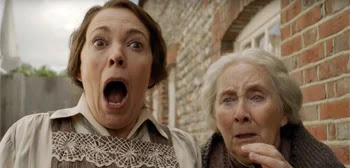or
A Comedy of Ill-Manners
I think I've mentioned before that you can't watch a British mystery series without one episode involving the investigation of a rash of poison-pen letters (that may or may not be true) that disrupt a community. There was one major movie, Henri-Georges Clouzot's The Raven, that we mentioned previously.
The origin of this particular trope came from the scandal of the "Littlehampton Letters", a Sussex incident that caused quite the scandal between 1920 and 1923. The general story is that Edith Swan, a spinsterish woman who lived with her upright Christian parents, began to receive letters of an unseemly manner and of such vulgarity that she made complaints to the police. Suspicions immediately turned to Edith's neighbor on Western Street, Rose Gooding, as Rose seemed a person of questionable character, known for causing rows and for her obscenity-laced language. It didn't help that the letters appeared to be signed by Rose. That first letter started: "You bloody old cow, mind your own business and there would be no rows. – R." That Rose had a child and was living with a man didn't help things. Nor did that the letters appeared after Rose was reported to Child Protective Services by someone in the neighborhood.
Rose was arrested and charged with criminal libel, and as she could not afford bail, she was in prison for three months. During Rose's incarceration, the letters naturally ceased. When she was released, the letters began again, expanding in scope, and Rose was again arrested, convicted and sentenced to 12 months in prison.All neat and tidy, said the law. But the story didn't end there, through the efforts of a dogged police-woman—Sussex's first—Woman Police Constable Gladys Moss, who began to suspect that things weren't as neat and tidy as her male counterparts believed it to be. With the help of Scotland Yard, she was able to trace who the letters were coming from—the courts wouldn't allow writing analysis in the trials—and catch the actual culprit in the act.
Wicked Little Letters tells the story of the case, and, truly, it lives up to it's opening title: "This is more true than you'd think." Oh, there are little changes here and there, mostly for the sake of diversity in casting, and to ram home the point that those times were more prejudicious than our own (although it's ironic that they try to make the point of how good we've got it by casting non-white players to signal to us that these people are dealing with oppression and prejudice*). Actually, our times are just as bad, only less by a matter of degrees.
Edith Swan is played by Olivia Colman, her parents by Timothy Spall and Gemma Jones. Jessie Buckley is Rose Gooding and her live-in man is Malachi Kirby. Anjana Vasan plays Woman Police Constable Moss, and Rose's neighborhood allies include Eileen Atkins, Lolly Adefope, and Joanna Scanlan. However much kerfluffle may have been going on in Western Street in the 1920's, it couldn't have been as entertainingly chaotic as this cast makes the circumstances involved. Colman, particularly, is a study in contrasts. Initially making friends with Buckley's Rose, Colman's Edith couldn't be more thrilled—a little shocked at her raw forthrightness—as Rose is as free-spirited as Edith is repressed, belittled, and subjugated in her father's household. When the whole letter-thing is delivered at her doorstep, she becomes alternately victimized, outraged, and (once the papers get ahold of it) prideful of her role as upright citizen standing up for the decency of civilization. Her performance is a master-class of expressiveness whatever the role Edith takes on.And Buckley holds her own with the more ostentatious part as Rose, unapologetically coarse even as she's being accused of coarseness, while fully realizing that she is just a gavel's slam away from losing her family as a consequence. But, her Rose is a scrapper, not willing to go down without a fight, even as it appears as her whole world is falling apart. And Vajan, after years of bit parts and one-line roles, pops right out of the screen as a determined copper not content to merely know her place, her eyes almost comically revealing the frustration and battling fierceness required to see justice done. Wicked Little Lies careens between comic (it's rated "R" for hysterically "pervasive language"), dire, and subversive—when dealing with authority figures (predominantly male)—and made with the intent of taking the mickey out of the status quo. There is just the hint of hysteria in the parties involved rebelling against their circumstances, even if the actions don't quite push through the complacency. One wants to call it a comedy of manners, if it wasn't so enthusiastically ill-mannered.It's also rather deliciously quaint, as one can only imagine the reaction any of these characters would have if they were exposed to social media.
* I don't want to harp on this too much, because I'll sound like some backwards stick-in-the-mud—you cast people because they're good, not because they're a "type"—but it occurs in the same way with the writers portraying Rose Gooding as an Irish immigrant, to reinforce that she was an outsider of "low" character. Gooding was born in Lewes in Sussex, and merely moved into the neighborhood, rather than coming from Ireland. Sometimes I think these things are betraying prejudices in the act of pointing them out. Anyway, the real people were all lily-white, and the actors portraying them are damned good.










No comments:
Post a Comment